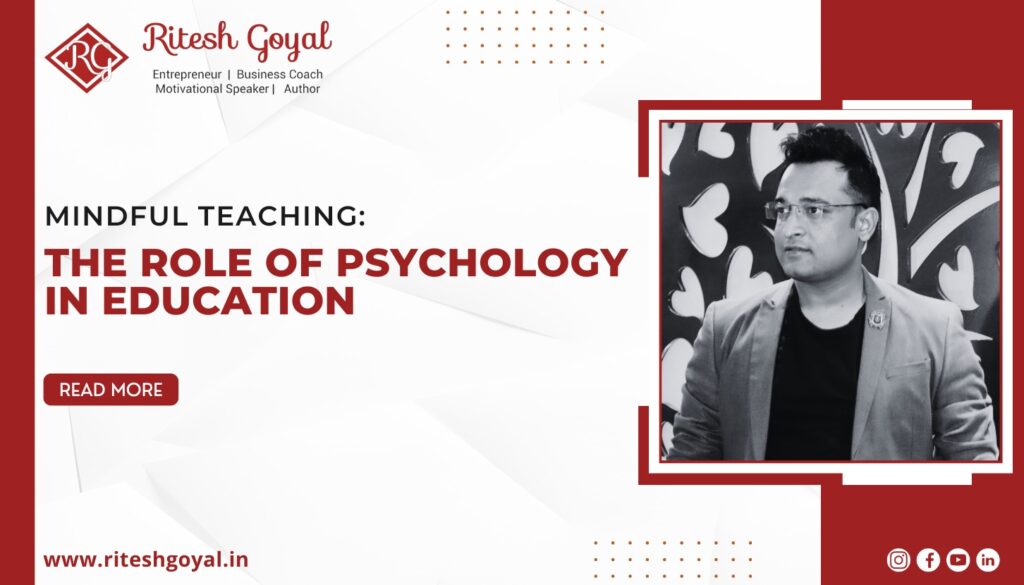
Mindful Teaching: The Role of Psychology in Education
By Ritesh Goyal, Educationalist and Managing Director of GIBS Business School, Bangalore
As we live in an increasingly knowledge-rich educational landscape, the challenge lies in creating an effective learning environment that not only imparts knowledge but also fosters the holistic development of students. As the Managing Director at GIBS Business School in Bangalore, I have come to recognize the significant influence psychology can have on education; therefore, this article examines its role in shaping teaching methodologies and improving student learning through mindfulness.
Understanding Mindful Teaching Methods
Mindful teaching entails being fully present with students and providing them with a supportive learning environment where their mental and emotional needs can be addressed alongside educational goals. Its foundation lies in psychological principles emphasizing awareness, empathy and continuous reflection by educators on their teaching practices.
Psychological Aspects of Learning
Learning is more than the mere accumulation of facts; it involves many psychological components including motivation, emotion, cognitive processes and environment. Understanding these aspects can significantly enhance teaching effectiveness; for instance studies have demonstrated that students perform best when motivated intrinsically – rather than through external rewards – and when their emotional and psychological needs are fulfilled.
Implementing Psychological Strategies in the Classroom
Psychology offers several strategies that can be utilized to enhance educational practices:
- Active Learning: Encourage your students to participate actively in their learning through discussions, problem solving sessions and group activities – this makes the subject more relatable and easier for all parties involved to comprehend.
- Differentiated Instruction: Recognizing that students possess varied methods of learning and abilities is critical in helping each student excel. Tailoring instruction according to these needs will ensure everyone’s success.
- Growth Mindset: Encourage students to adopt a growth mindset by emphasizing that intelligence and abilities can develop with hard work and dedication, encouraging them to embrace challenges, persist through difficult situations, and see failure as part of learning. This approach empowers children with confidence that learning comes in all shapes and forms.
Mindfulness in Education
Applying mindfulness in education means taking an approach that seeks to be aware of both educational and emotional dynamics at play in all interactions within the classroom environment, including:
- Emotional Awareness: Tuning into students’ emotional states and adapting teaching methods accordingly in order to provide comfort or challenge, depending on each child’s needs.
- Reflective Practice: Regularly reflecting on one’s teaching style, classroom environment and student responses is crucial in continuously increasing teaching effectiveness. This process aids in continuous growth.
- Building Resilience: Teaching students how to effectively manage stress and anxiety through mindfulness techniques such as deep breathing or meditation is essential to their academic performance as well as maintaining overall well-being. This practice not only assists them academically but can also benefit their overall well-being.
As educators, it is crucial that psychological insights are integrated into teaching methods. To do this successfully, educators can:
- Continuous Learning: Staying current with recent psychological research that pertains to educational settings.
- Collaboration: Partnering with school psychologists and counselors to establish supportive learning environments. Professional Development: Participating in workshops and training on psychological and pedagogical approaches so as to incorporate these insights into teaching practice.
Conclusion
Psychology plays an integral part in education by creating a bridge between teaching and students’ psychological needs and those of educators. By employing mindful teaching practices, educators can foster an inclusive and effective learning environment that prepares children both academically and socially and emotionally for life beyond school. Through exploring this synergy between psychology and education, it has become evident that our ability to understand our learners’ mental frameworks will determine whether we provide truly impactful education or not.
As an educationist, mindful teaching is not simply a method; rather it is an approach that prioritizes both psychological and academic wellbeing of our students. Let us all commit ourselves to mindful education where each classroom becomes a space for growth, empathy, and lifelong learning.
